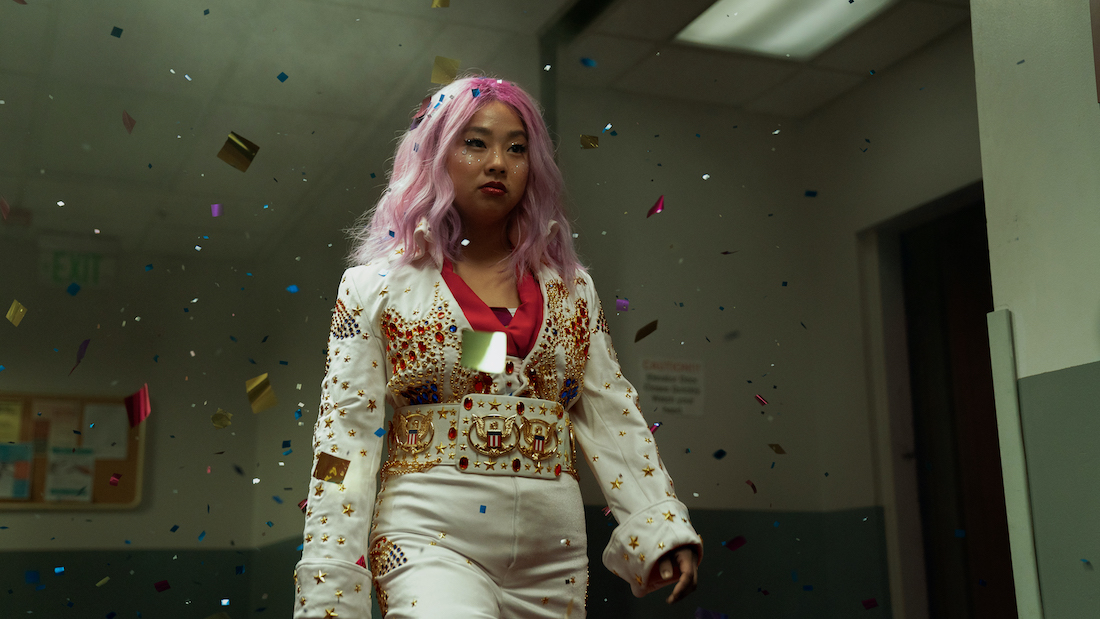Stephanie Hsu plays two roles in the dazzlingly kaleidoscopic movie “Everything Everywhere All at Once,” written and directed by Daniel Scheinert and Dan Kwan (known together as Daniels). She is Joy, the daughter of laundromat owners Evelyn (Michelle Yeoh) and Waymond (Ke Huy Quan). And she is also multiverse-transcending ultra-villain Jobu Tupaki in an eye-popping series of astonishing costumes. In an interview, Hsu talked about some of her favorite outfits, which Daniel was best to go to for which kind of question, and how to spot both directors in the film.
I’m seeing the film for a second time tonight, this time in IMAX, and can’t wait.
I’m excited for you to watch it the second time because once you’ve already decided that you’ve surrendered to it and trust it you can just watch it. I’ll be there, too!
We only get a brief look at Joy’s relationship with her girlfriend, Becky, played by Tallie Medel, but somehow you both manage to convey a great deal about the strength of that connection.
Tallie is incredible. I have known her since before I knew the Daniels from the world of experimental theater. She is a part of a dance comedy troupe called Cocoon Central dance team. They’re amazing. And we worked together back in the day. And then when I met the Daniels, I found out that they all went to college together and that they knew one another and they had worked with Tallie a bunch in music videos. When I got brought on board to do this movie, they asked me if I had anyone in mind who I wanted to play my girlfriend, and I was like, “Tallie is one of the most amazing actors ever, and I love her and you’re friends with her and I’m friends with her so let’s try to get Tallie.” And luckily, we did.
And she’s honestly a very supportive, loving, amazing actress and friend. I am so floored by the work she does in this film because it’s for a hot second and the audience is impacted immensely.

We also see a lot of layers right from the beginning in the relationship between Joy and her mother.
Michelle is beyond just one of the most talented people in every universe. She is the most loving, generous, kind, funny, silly person ever. From the very beginning she led with love for all of us. Chemistry is not something you can really make up. It’s a testament to casting, it’s a testament to the Daniels. But we all just felt like a family immediately. We went to Korean barbecue the weekend before we started filming and it was just like that, where everyone just completely was so happy to be there and to surrender to the process.
The only reason why I was able to do anything I did in the movie was because I had Michelle, who was also such a generous scene partner. I don’t think I felt intimidated necessarily; I just wanted to rise to the occasion and rise to the task. But I look back on it now and it wasn’t until we had our first press interview with all of us on Zoom and I was like, “Have I always been the youngest person in this cast? Wait, what’s going on? How did this happen?” I just can’t believe I got so lucky to be with truly some of the greats of our time. And I feel like I was just at a masterclass every day. But beyond that, I felt everyone’s willingness to also learn from me too, that there was this collaborative spirit of “What do you have to bring to the table?” And that’s so special.
Daniel Kwan and Daniel Scheinert have worked together for quite a while, so closely they just bill themselves as Daniels. How did you interact with them?
Making films is objectively stressful. But they trust each other so much, truly. They are incredible artistic guides for the collaborative process not only with us and the crew but also with one another. Because if they started to be territorial about who gives who direction, then all of this would fall to pieces because they would be combating each other during the whole process. But instead, they have a very organic relationship.
The nice thing about two directors is there’s a million things going on set. If lighting needs to be adjusted then maybe one day Kwan will go talk to lighting or to our DP Larkin Seiple. In some ways, they really allocate quite peacefully and organically. I think personally as an actor, I started to figure out who I liked to ask for what questions. And I think Dan Kwan is much more of a maximalist. They’re both crazy but for this movie, in particular, Dan, he loves physical comedy, and he’ll be like, “I don’t know, try anything, do this and then pick your nose.” If I had a scene work question, maybe I’m going to go ask Scheinert. He used to act in college. And so he loves getting into the nitty-gritty of scene work. Sometimes when I was looking for a more intimate answer, I would find myself going to Scheinert. But sometimes I would also shake it up. And that was the beauty of collaborating with them.

You had so many different relationships and personas over so many different scenes. Did you have some kind of a spreadsheet to keep track of who you were at any given moment?
I drew a map of both Joy and of Jobu. The thing I love about films is you know the beginning, middle, end so I knew that the end was going to end up with the parking lot scene. So, I drew a map to also figure out when Joy and Jobu would start bleeding together to land back at joy.
But something we talked about in crafting this character of Jobu is making sure that the nihilistic villain is not cliché but always rooted in the same despair or philosophy as Joy. And we really kept each other honest about that because it’s easy to be weird and chaotic and make things happen or make funny noises. But it’s harder to make sure that that’s coming from a real true darkness that also has a lot of heart beneath it.
And where does that name come from?
It came from Dan Kwan trying to figure out baby names. And he was just going through this list of fun baby names to say, and Jobu Tupaki happened.
The movie is wildly imaginative and yet very grounded.
We really wanted to make sure that the family was a very normal family and a very average family where you have to do something as mundane and as terrible as the taxes every single year, and you’re failing to do so and your house is a mess and your father is waking up and he’s angry because the noodles are cooked wrong. It wasn’t meant to be a bunch of superheroes in their house. What I love about our film is that it’s so wild and out there and it’s so complex, that it transcends identity politics. It is an Asian family, it is an immigrant family, Joy is gay, but that’s all part of the texture. It’s not hinging upon the fact that this is who they are. And I think it’s really important for the next steps of what inclusion or diversity mean in Hollywood. When I wake up in the morning I’m not like, I’m Asian. I’m just like okay, coffee.
Do you have a favorite of all the costumes you wore?
I give a different answer to that question every time I am asked. At this minute, I think it has to be the Elvis costume with my pink hair and pig on a leash!

Joy and Jobu have very different postures and movements, so tell me a little bit about the physicality of the characters.
What I love about Joy, and truly this whole family, is that they’re very ordinary. And in many ways, I wanted to be unafraid of exposing the ugly of Joy, and how that weight carries on her, how the despair carries in her body.
But Jobu was kind of funny. We liked to play with her ability to switch on a dime, almost the way that a cartoon could switch on a dime. So, there were parts of her that were very amoeba-like and sneaky, and so impulsive that she could be slinking down a hallway, and then hit something off the wall. Or there were moments where she could be completely composed. And so, for Jobu we really wanted to play with the versatility of her body and also that at any moment she could just blow something up. And also, I did some wushu training before this movie with Li Jing who is actually the Kung Fu master in the film, who trains Michelle. There’s something about wushu and martial arts in general that build strength and ease. And even though I didn’t have a fanny pack fight scene I think that that training really gave me a sense of soft power in some ways and a very embodied strength that carried with me throughout the film.
Is it true that the Daniels are in the film?
When Evelyn is in the alleyway in Asia and getting jumped by people, Daniel Kwan is one of the people who’s jumping her. And then he’s also an engineer in the IRS building. He’s the first face that’s getting sucked by the bagel. Daniel Scheinert gets to have the best director cameo in Hollywood history. I’m pretty positive he’s the BDSM guy and the ape with the hot dog fingers!
What surprised you when you first watched the film?
Watching yourself on screen is very vulnerable. I feel very exposed. But I could not have wished for a better first feature to introduce myself to the world of Hollywood because this is so quintessentially something that I want to make. This is what I want for movies: stories that are original, crazy, and heartfelt, never before seen, not a franchise, and inspire us to come together to have a shared experience and are joyfully weird and fearless.
Up until we showed it at SXSW—even though we all love this movie so much of course, the missing piece is the audience—we just could not have possibly expected the reaction. People really get it.
“Everything Everywhere All at Once” is now playing in theaters nationwide.












